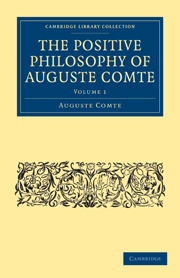CHAPTER V - THE ANIMAL LIFE
Published online by Cambridge University Press: 29 August 2010
Summary
It was only by a late and long-prepared effort that the human mind could attain that state of abstraction and physiological generality necessary for the comprehension of all vital beings,—from Man to the vegetable,—as one series. It is only in our own day that a point of view so new and so difficult has been established; and as yet, among only the most advanced minds, even as regards the simplest general aspects of biology,—in the statical study of the organism. It is not at all surprising that physiological comparison should have been first applied to the animal functions, because they first suggest its importance and possibility, however clearly it may afterwards appear that the organic life at once requires and admits a larger and more indispensable application of the comparative method. Looking more closely, however, into this evident existing superiority of animal over organic physiology, we must bear in mind the distinction between the two elementary aspects of every positive study,—the analysis of phenomena and their explanation. It is only with regard to the first that the animal life has been in reality better explored than the organic. It is not possible that the explanation of the most special and complex phenomena should be more advanced than that of the most simple and general, which serve as a basis to the others. Such a state of the science would be in opposition to all the established laws of the human mind.
- Type
- Chapter
- Information
- The Positive Philosophy of Auguste Comte , pp. 443 - 457Publisher: Cambridge University PressPrint publication year: 2009First published in: 1853



